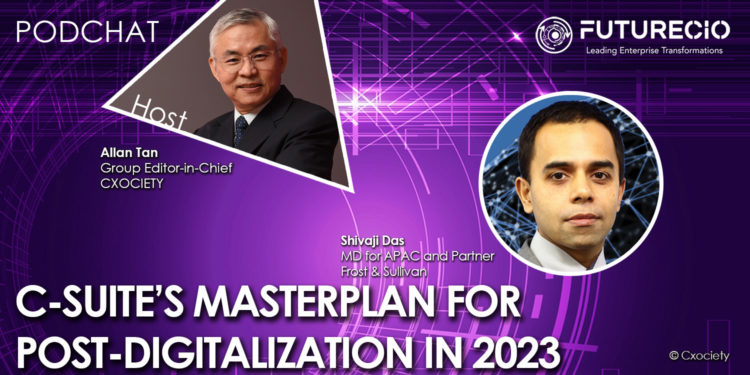With Asia on the cusp of economic recovery following over two years of volatility arising from multiple crises seemingly contriving to pose unrelenting challenges on economies, businesses, and societies in general, have business leaders sufficiently transformed their organisations to lead and thrive in the new normal?
At the 2022 C-Engage Convention, a recurring commentary among the speakers was how leadership has changed since 2020.
Presenting on the topic of C-Suite’s Masterplan for Post-Digitalisation in 2023, Shivaji Das, Frost & Sullivan partner and managing director for Asia Pacific, noted significant differences in leadership roles and priorities since 2020.
“During the pandemic, our main concerns were how to keep the supply chains, deliveries and factories running while ensuring the health of the employees,” he observed.
“Right now, we are facing an entirely different set of challenges brought about by high inflation, shortage of talent, and slowing growth while the costs remain high. Leaders have had to come up with strategies to overcome such uncertainties and tap opportunities to stay ahead of their competitors.’
Shivaji Das
Do you see digitalisation accelerating or decelerating in the years ahead given all the investment that has been put in there right from the very beginning, particularly in the last 3 years?
Shivaji Das: It seems to be slower than it was in the past few years. Given the cost pressures and economic uncertainties, digital investments are possibly delayed.
But investments in cybersecurity, enabling new business models or moving to the cloud can help save costs in the long run so I believe these will continue to grow at a steady rate.
What would you say are maybe the three most influential factors that leaders will bear in mind as they plan for the years ahead?
Shivaji Das: Frost and Sullivan surveyed about 500 large and small organisations around the world and found the top three factors are 1) Ensuring revenue and margin protection, 2) Improving customer experience, and 3) Improving employee productivity.
These three points will guide the management in terms of decision-making for investments, digital focus and managing employees.
Any suggestions on how leadership moving forward can narrow the gap that exists between investments around data management and protection and dissatisfaction with the results?
Shivaji Das: There is indeed dissatisfaction with the use of data analytics and artificial intelligence. I would suggest setting realistic goals. Every business is unique so do not take a standardised approach and expect benefits out of it.
Another is ensuring the organisation has the right talent and support. Educate people of all levels on the usage and benefits of new technologies and do trials before going ahead with big investments.
What do you anticipate will be the workplace in the future and what should leaders do to maximise their operating model?
Shivaji Das: In the past, everyone used to work in the office, but this has changed since the pandemic. Employees, especially the younger generation, prefer flexibility and work-from-home offers.
At the same time, we have seen an increase in productivity so instead of going back to how things used to be, find a way to foster a sense of culture and belonging depending on what works best for the organisation.
How can leadership better manage the post-pandemic hybrid operating model that is bringing with it new risks?
Shivaji Das: There are operational risks related to cybersecurity, privacy, data or even devices. There are instances of employees abusing the system and it is overlooked when the top management is oblivious.
Leadership training and timely intervention become important. Manage your workforce better by engaging more, breaking silos, and creating a sense of belonging.
Can you describe for us what distributed trust is and offer some recommendations on how leadership can tap into this distributed trust idea?
Shivaji Das: The concept of trust has greatly evolved when it comes to the selection of employees, customers, and vendors. Previously, we could simply look at credit ratings or other independent ratings to get a sense of understanding and trust in a person.
But these days, it is more about the influence of a person or organisation perceived by individuals, consumers or even by thought leaders.

"Organisations today face different sets of challenges such as economies slowing down, cost pressures, and talent attraction and retention. We need to have a well-planned strategy to embrace digitalisation, technology, management concepts and work practices that will enable us to cope with uncertainties and drive towards growth and higher margins for the organisation."
Shivaji Das
Click on the PodChat player and hear the details of Das’ c-suite’s masterplan for post-digitalisation in 2023.
- If we look from before the pandemic, and throughout the period of extended uncertainties, how have the roles of executive leaders evolved?
- As economies begin the road to recovery, we anticipate a natural acceleration of growth among businesses in Asia. Do you see digitalization as accelerating or decelerating in the years ahead?
- What factors would have the most influence on reshaping the priorities of leadership in the years ahead?
- At the C-Engage Convention, you spoke about a gap that exists between investments by companies around data management and protection, and the less than the satisfaction that leadership are reporting following these investments. Any suggestion on how to narrow this gap?
- You also mentioned that organisations are not expecting to return to pre-pandemic ways of working. What do you anticipate the workplace will look like in the coming years?
- What should leaders do to maximise the benefits of these new workstyles?
- You also observed that the post-pandemic hybrid operating model is bringing new risks. How can leadership better manage these evolving risks?
- Finally, you spoke about distributed trust and how it is shifting relationships between consumers and organisations. Can you offer some recommendations on how to tap this distributed trust?




